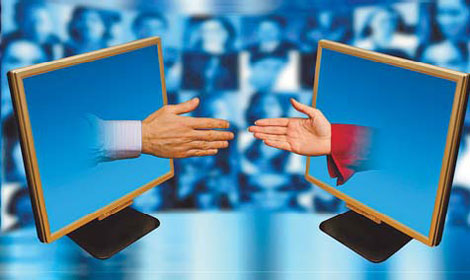Life and Leisure
Netiquette trumps technological naivete
By Christof Kerkmann (China Daily)
Updated: 2010-10-27 08:13
 |
Large Medium Small |
|
Etiquette experts call for new standards of behavior for the digital age. Provided to China Daily |
Do we need a new etiquette guide for the digital age? Many users are uncertain just what belongs on the recent generation of Web 2.0 services like Facebook and Twitter.
Ask users whether a "Miss Manners 2.0", like the syndicated newspaper column on etiquette, would be perceived as helpful or not and you'll get an answer that perhaps reflects generational fault lines as much as anything else.
Never make a phone call in a public toilet. Don't put anything on Facebook that might be embarrassing to you in two years. And don't post binge-drinking pictures that will give your boss reason to reconsider your responsibilities.
Rules like these are all the rage right now. Etiquette experts and politicians are calling for new standards of behavior for the digital age and if they're not it's because they're busy putting together their own Miss Manners 2.0. Yet there's room for debate over the value of such guides. Are they really helpful? Or are they just statements of the extremely obvious?
The search for orientation isn't coming out of thin air. On the one hand, there's definitely a rough-and-tumble undercurrent on the Internet, particularly when users can post their thoughts anonymously, such as in blogs or on the comments section of news sites. On the other hand, sites like Facebook and Twitter represent a difficult new terrain, with user populations that have exploded in the last couple of years.
The German "Knigge Council", named for that country's godfather of manners, Adolph Freiherr Knigge, has taken action. Its codex contains 12 points to assist with "the stylish cultivation of contacts through social media". And Internet service provider Deutsche Telekom is even offering "101 guidelines for the digital world" on its "e-Etiquette" website.
The target audience for these updated manners guidelines is actually not young people, explains manner expert Rainer Waelde. "Those who are already masters of the social networks don't need style guidelines. But people born before 1980 are often unsure with Facebook and Twitter," Waelde says. Older users in particular show a certain "technology naivete," says the chairman of the German Knigge council. "The younger generation is significantly more restrictive with its data."
Yet in today's age it's not so simple to formulate generally applicable rules. One place where this becomes clear is in interactions between colleagues and the boss, for example. The primers on style recommend against mixing business and pleasure.
"Users should only reveal private matters in doses and should establish private zones," Waelde says.
Knigge urges Internet users to "consider in advance which contacts you want to cultivate with which network. Your customers should not necessarily be your 'friends' and may perceive that description as inappropriate or overly intimate."
To prevent the line between business and pleasure from getting blurry, it's permissible to quietly ignore the "friend" requests that arise on social networks, says the e-Etiquette guide from Telekom. And naturally one should only put those photos on the network that won't shock your mother.
Not all Web users share this opinion. "This contradicts rather drastically with the real-life experiences of all creative types who need to get their own persona out there to establish their brand," writes blogger Jakob Jochmann, who studied intercultural communication.
The "Knigge 2.0" is a cookie-cutter approach to behavior that could lead unseasoned users astray if applied in the wrong context. "The societal trappings for a Web designer are going to be quite different on the Internet from those of an antiquities restoration expert," Jochmann says.
US magazine Wired, long an opinion leader in the area of digital culture, somewhat cheekily suggests a relaxed attitude to privacy issues. Publish odd photos or comments on your own and you limit the impact.
Others see this kind of codex as a decent base for discussion. Blogger Stefan Pfeiffer is one of them. The criticism is too short sighted, because "every serious attempt at elucidation is 100 percent welcome", regardless of who's proposing it. "It then is (hopefully) not an existing work, but rather a Knigge-style book that can be updated continuously in a Wikipedia style," writes the blogger, who works for IBM.
German Press Agency
